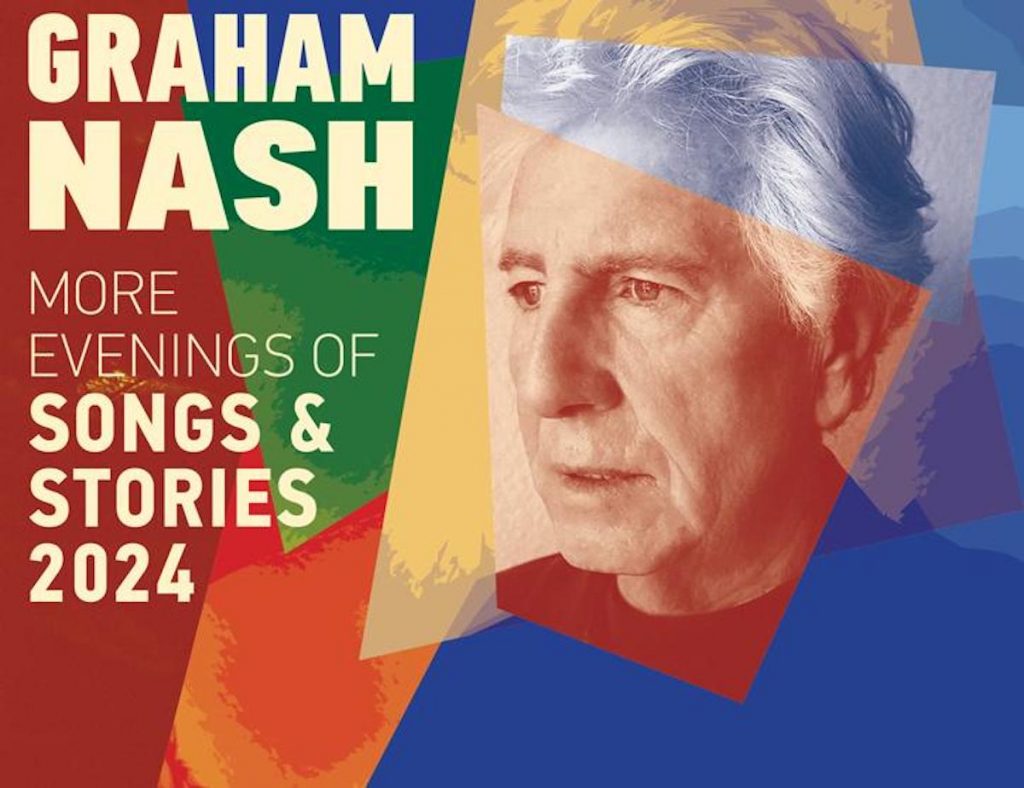Culture
Graham Nash steers a timeless ship across 60 years of music and stories
By: Rosie Wong
Posted on:
ATHENS, Ohio (WOUB) – Two-time Rock and Roll Hall of Fame inductee and renowned singer-songwriter Graham Nash nearly filled the Templeton-Blackburn Alumni Memorial Auditorium (47 East Union Street) when he performed in Athens last week.
Alongside Todd Caldwell (keyboards and vocals), Adam Minkoff (bass, drums, guitars, and vocals) and Zach Djanikian (guitars, mandolin, drums, and vocals), Nash took his audience all over his six decades-plus long discography.
The curtains opened with Crosby, Stills and Nash’s Wasted on the Way. The harmony between Nash and his co-performers on stage was miraculous. Vocally, their voices added layers and depth to each other’s part, whether they were singing lyrics or simply notes. Instrumentally, the cohesive sound traveled across the auditorium, filling up the space with notes that lingered. As he moved from one song to the next, from his guitar to the piano, he shared a glimpse of a background story for each song, setting the scene for a new world his piece was about to depict.
The show utilized lights tactically. For example, before To the Last Whale: Critical Mass/Wind on the Water, all the stage lights were dimmed, and it was only left with warm candlelight and instrumental. I felt the stage expanding, forming a sense of grandiosity along the musical progression. Nash was also engaged with the audience with a strategic use of stage lights. In Love the One You’re With, he stopped at times to have a sing-along moment with the audience, as a light projected at the audience. And the audience sang in unison, passionately.
As much as music is about sound, it’s also about a strategic use of silence. I found the stops and the variations of tempo in Cathedral to be meticulously executed to take the audience’s experience on a ride to that distant, historic place.
Besides his tenor voice, I’d like to point out that Nash’s enunciation of words, spoken and sung, was pleasantly clear. Effortless yet expressive, he sang his lyrics and pronounced his words so clearly that it felt like he was talking with the audience. And he was. He shared bits of his life stories about family and society, his traveling, his nervousness meeting Bob Dylan, and his spontaneous songwriting process with his famous collaborators David Crosby and Stephen Stills.
Nash drew the audience in with experiences that inspired his songs like Marrakesh Express, Immigration Man, and Just a Song Before I Go. He also reflected on his past with artist Joni Mitchell and the way Our House came to life. It marked the biggest sing-along of the night.
Leading to Prison Song was Nash contemplating his father’s unjust arrest and later seeing someone else being sent to prison. In a sentimental song as such, using words like “I’ll have to leave you” and “farewell” poeticizes its storytelling while getting his emotions across through music.
In Military Madness and Ohio, he channeled the message in the songs as a commentary to today’s society and a sincere call for justice and peace. And the depth of messages is what seems to matter to him the most in his music, as he sings “We can change the world” in Chicago.
I was lucky to talk to two audience members at the show.
Annette Miller, an Ohio University alum of class of 1979 and a fan of Nash since 1969, said she heard sincerity in Nash’s performance.
“Although his voice has changed, (the change) doesn’t diminish his music. (His) words speak for themselves,” Miller said.
Waving her hands in the air to the rhythm was Kat Rakel-Ferguson, one of the most excited audience members in the auditorium. She has been a fan of Nash since 1966. In reference to the last song of the night Ohio, to her, his music carries a lot of weight.
“It’s not just a song. We were there,” she said.
By the end of the show, the audience rose from their seats and applauded this unforgettable evening. The audience members followed the artists with their eyes as they gestured their appreciation for the crowd and exited the stage.
This article is written based on my experience at the show. As much as I would love to seize every meaningful moment from a live performance, no words can fully capture an experience of being present in the same room where music and storytelling take place.


